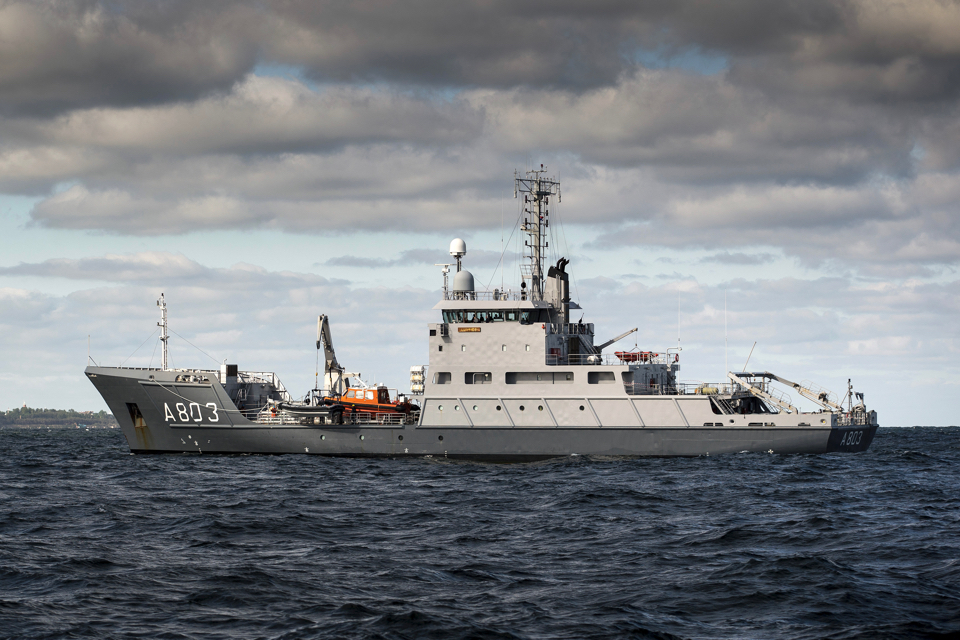The Royal Netherlands Navy is replacing its current ten support vessels by eight new ones. The vessels will be able to operate on methanol and are to be built by a Dutch shipyard. Marineschepen.nl reports at least three yards are interested in the contract: Damen Shipyards, Thecla Bodewes Shipyards and Royal IHC.
The current vessels perform various support tasks and will reach the end of their service lives in the coming years. State Secretary of Defence, Christophe van der Maat, presented the plans for the new vessels to Dutch Parliament after the research phase (the so-called B-phase) was concluded in June 2022.
Also read: Dutch navy’s new support vessels will sail on methanol
Current vs. new vessels
The navy currently has five sea-going support vessels and five diving support vessels.
The five seagoing vessels are:
- Torpedo work ship HNLMS Mercuur that supports submarines. It stores practice torpedoes and functions as a target ship and safety and supply platform. End of life: 2026.
- Navy training ship HNLMS Van Kinsbergen. This supports the training of aspiring naval officers and non-commissioned officers. End of service life: 2024.
- The two identical hydrographic survey vessels HNLMS Luymes and HNLMS Snellius. They survey the seabed so that the Ministry of Defence can maintain nautical maps of the Dutch sector of the North Sea and the Caribbean. End of life: in the period 2033-2034.
- Support vessel HNLMS Pelikaan. This vessel transports equipment and personnel in the Caribbean area and provides support in disaster relief and military operations. End of service life: 2031.
The current five diving vessels act as platforms for divers. Among other things, for clearing explosives, port protection, maintenance and training. The end of lifespan for these vessels is 2026-2027.
From ten to eight
By having the new vessels combine various functions, the navy can manage with eight new vessels instead of the current ten.
The four new seagoing vessels will largely be the same. However, there will be two sub-types, as certain components will differ. These include the working deck and specific sensors. The first type combines the tasks of the current torpedo work ship and the hydrographic vessels. The second combines the tasks of the support ship Pelikaan and the training ship.
The four new diving support vessels will all be completely the same.
Methanol
The vessels will be equipped with dual-fuel systems that can use methanol. In principle, they will run on climate-neutral methanol, but if that is not available, they will use grey methanol or diesel. By building the vessels in the Netherlands, the development of climate-neutral technology will be given a major boost.
If green methanol is used in full, the eight new support vessels will emit 13 kilotonnes less CO2 per year than the current vessels. Plans to opt for emission-free propulsion were already revealed in 2020 and reaffirmed in the 2022 Defence Memorandum.
Also read: Dutch Navy considers green methanol as fuel for its support vessels
Building contract
The Dutch Ministry of Defence will have the support vessels designed and built by a yet to be selected Dutch shipyard. The intention is to buy all eight with one combined contract. Maintenance will also be included in the contract. This is done to reduce the maintenance tasks of the navy.
Marineschepen.nl now reports at least three Dutch shipyards have shown interest in the contract: Damen Shipyards, Thecla Bodewes Shipyards and Royal IHC. The other two candidates associated with the project are Holland Shipyards and Neptune Marine. Marineschepen.nl says Holland Shipyards has decided not to bid for the tender. Neptune Marine has refused to comment.
Construction will involve between 250 million and 1 billion euros. Who will build the ships is expected to be announced in 2024.
Picture: Current hydrographic survey vessel HNLMS Luymes.
Also read: Royal Netherlands Navy hands over command of NATO fleet








